人教版(2019)必修第一册Unit 2 Travelling Discovering Useful Structures(共28张ppt)
文档属性
| 名称 | 人教版(2019)必修第一册Unit 2 Travelling Discovering Useful Structures(共28张ppt) |
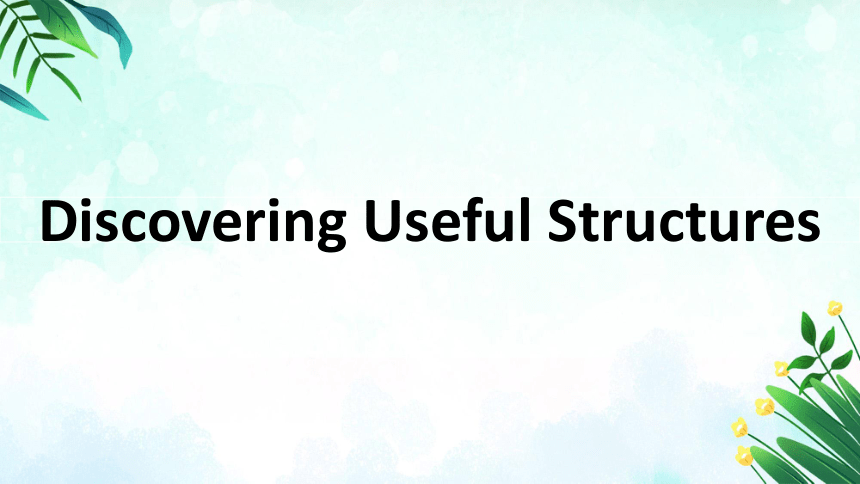
|
|
| 格式 | pptx | ||
| 文件大小 | 2.2MB | ||
| 资源类型 | 教案 | ||
| 版本资源 | 人教版(2019) | ||
| 科目 | 英语 | ||
| 更新时间 | 2024-07-28 16:24:19 | ||
图片预览

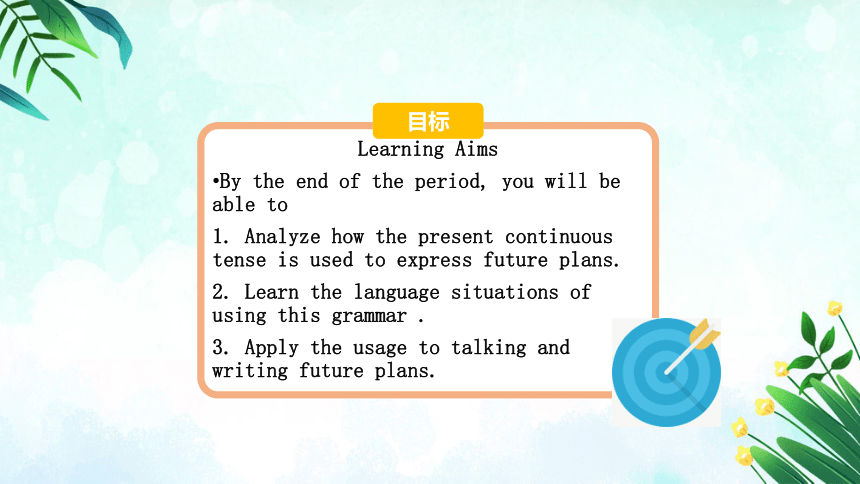
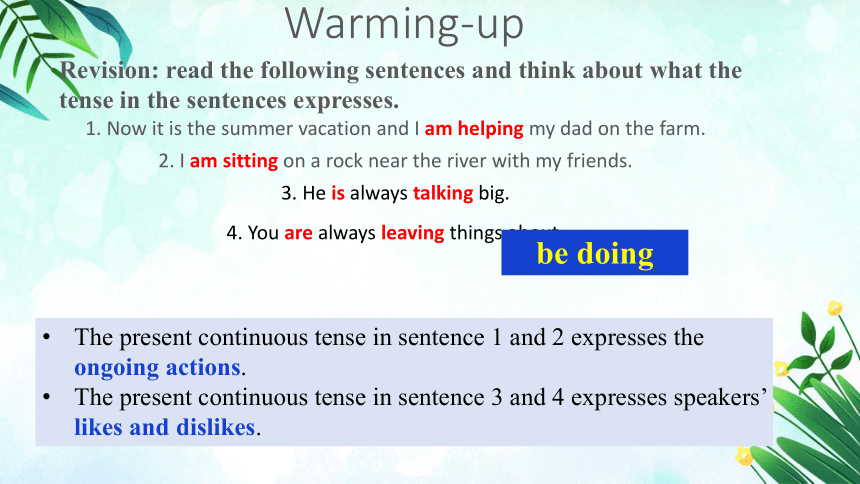
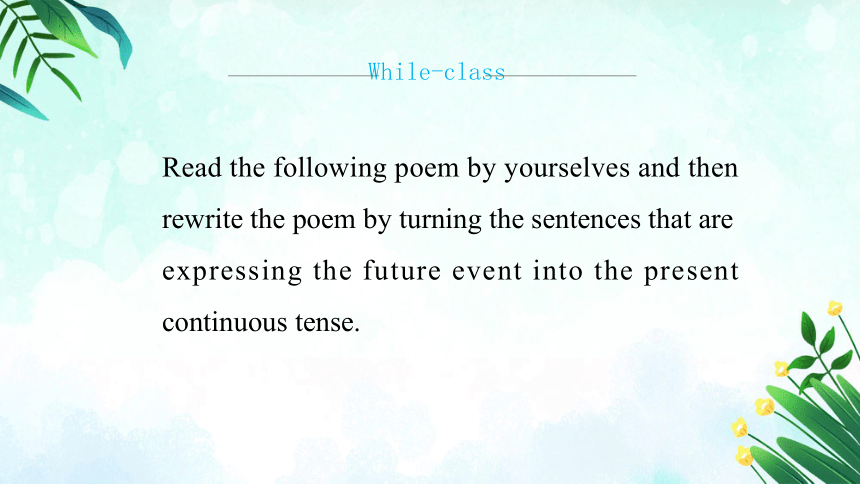
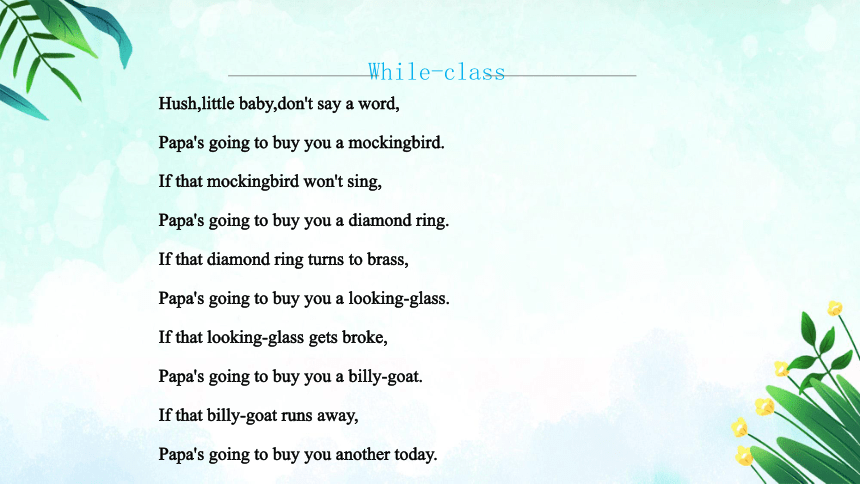
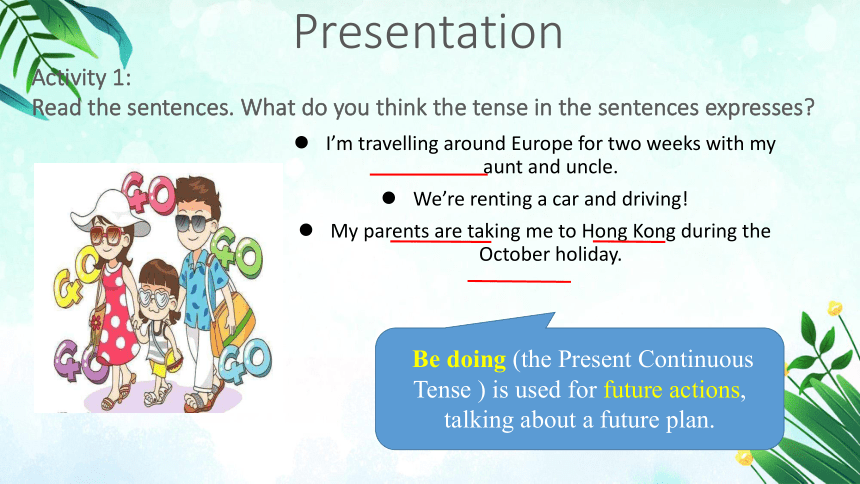
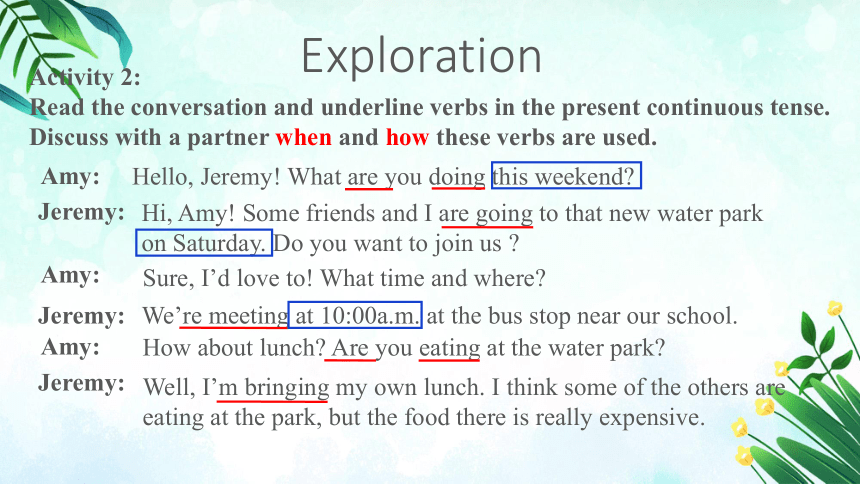
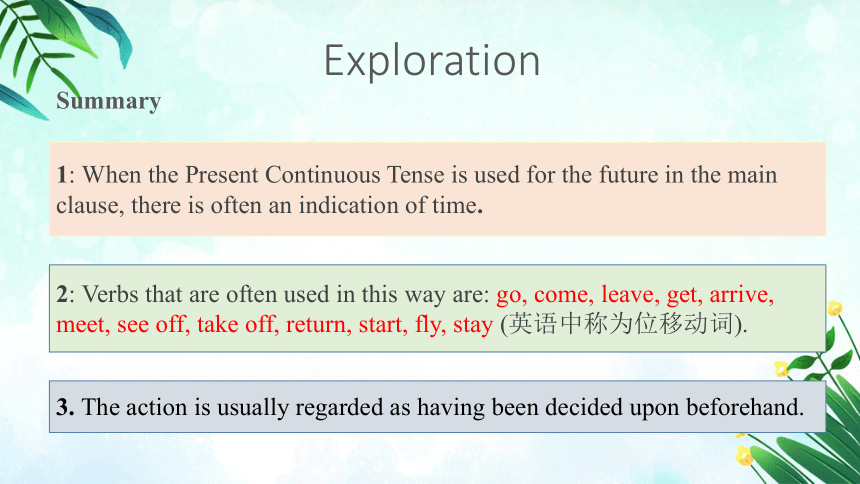
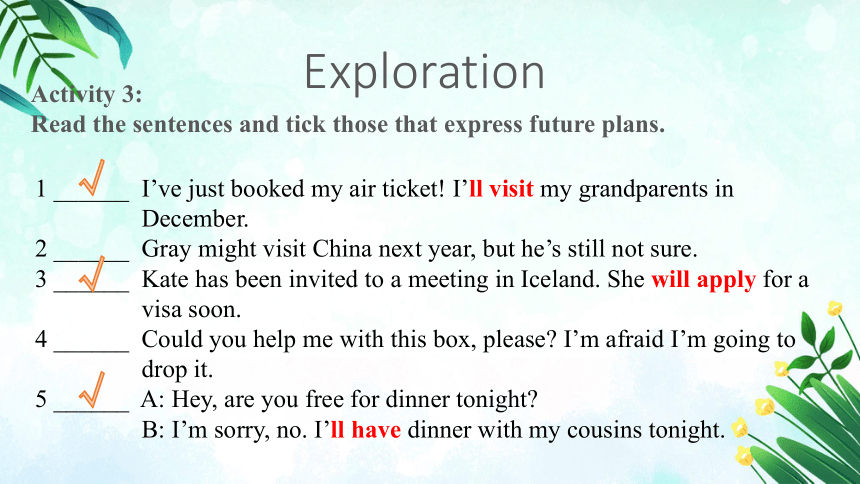
文档简介
(共28张PPT)
Discovering Useful Structures
Learning Aims
By the end of the period, you will be able to
1. Analyze how the present continuous tense is used to express future plans.
2. Learn the language situations of using this grammar .
3. Apply the usage to talking and writing future plans.
目标
Warming-up
1. Now it is the summer vacation and I am helping my dad on the farm.
2. I am sitting on a rock near the river with my friends.
3. He is always talking big.
4. You are always leaving things about.
Revision: read the following sentences and think about what the tense in the sentences expresses.
The present continuous tense in sentence 1 and 2 expresses the ongoing actions.
The present continuous tense in sentence 3 and 4 expresses speakers’ likes and dislikes.
be doing
While-class
Read the following poem by yourselves and then rewrite the poem by turning the sentences that are expressing the future event into the present continuous tense.
While-class
Hush,little baby,don't say a word,
Papa's going to buy you a mockingbird.
If that mockingbird won't sing,
Papa's going to buy you a diamond ring.
If that diamond ring turns to brass,
Papa's going to buy you a looking-glass.
If that looking-glass gets broke,
Papa's going to buy you a billy-goat.
If that billy-goat runs away,
Papa's going to buy you another today.
Presentation
I’m travelling around Europe for two weeks with my aunt and uncle.
We’re renting a car and driving!
My parents are taking me to Hong Kong during the October holiday.
Activity 1:
Read the sentences. What do you think the tense in the sentences expresses
Be doing (the Present Continuous Tense ) is used for future actions, talking about a future plan.
Exploration
Activity 2:
Read the conversation and underline verbs in the present continuous tense. Discuss with a partner when and how these verbs are used.
Amy:
Jeremy:
Hi, Amy! Some friends and I are going to that new water park on Saturday. Do you want to join us
Amy:
Jeremy:
Jeremy:
Hello, Jeremy! What are you doing this weekend
Sure, I’d love to! What time and where
We’re meeting at 10:00a.m. at the bus stop near our school.
How about lunch Are you eating at the water park
Well, I’m bringing my own lunch. I think some of the others are eating at the park, but the food there is really expensive.
Amy:
Exploration
1: When the Present Continuous Tense is used for the future in the main clause, there is often an indication of time.
2: Verbs that are often used in this way are: go, come, leave, get, arrive, meet, see off, take off, return, start, fly, stay (英语中称为位移动词).
3. The action is usually regarded as having been decided upon beforehand.
Summary
Exploration
Activity 3:
Read the sentences and tick those that express future plans.
1 ______ I’ve just booked my air ticket! I’ll visit my grandparents in
December.
2 ______ Gray might visit China next year, but he’s still not sure.
3 ______ Kate has been invited to a meeting in Iceland. She will apply for a
visa soon.
4 ______ Could you help me with this box, please I’m afraid I’m going to
drop it.
5 ______ A: Hey, are you free for dinner tonight
B: I’m sorry, no. I’ll have dinner with my cousins tonight.
√
√
√
Exploration
1. I’ve just booked my air ticket! I’ll visit my grandparents in December.
I’ve just booked my air ticket! I’m visiting my grandparents in December.
3. Kate has been invited to a meeting in Iceland. She will apply for a visa soon.
Kate has been invited to a meeting in Iceland. She is applying for a visa soon.
5. A: Hey, are you free for dinner tonight
B: I’m sorry, no. I’ll have dinner with my cousins tonight.
B: I’m sorry, no. I’m having dinner with my cousins tonight.
Rewrite the sentences in the present continuous tense.
Exploration
2. Gray might visit China next year, but he’s still not sure.
4. Could you help me with this box, please I am afraid I’m going to drop it.
Why cannot sentence 2 and sentence 4 be written in the present continuous tense
The decision has not been decided yet.
be going to do refers to the speaker’s intention rather than his future plans.
Summary 1: be doing 和be going to do 都可以表示即将要做的事情。前者更强调事先计划好的安排、确定要做的事情;后者表示说话者的打算和意图,还可表示根据当前情况作出的预言。
Exploration
1. I ________________(always, love) you.
2. My parents and I __________(visit) the Architecture Museum this weekend.
3. I think you _________(find) this guidebook useful.
4. We___________(take) a trip to Hubei next month to see my grandmother.
5. _________________(you, contact) the travel agent this Friday
6. If you ask him, I’m sure he __________(give) you a ride to the airport.
Activity 3 on Page 79
Decide whether will do or the present continuous tense is better and fill in
the blanks.
will always love
are visiting
will find
are taking
Are you contacting
will give
Summary 2: will do 和be doing表示即将发生的事情时, will do 更强调个人意愿和瞬间的决定。而be doing 强调事先计划好的安排。
现在进行时表示将来
The Present Continuous Tense can be used to express a plan or an arrangement.
现在进行时态可用来表示一个在最近按计划或打算要进行的动作;表示将来意义的现在进行时态由句中表示将来时间的词语或上下文表明。
The Present Continuous Tense for Future Actions.
Betty is leaving for Guangzhou by plane tomorrow.
Bob is going to the airport by taxi next week.
I'm seeing the dentist this afternoon.
Are they staying here for long
现在进行时态表将来,主要用于表示按计划或安排要发生的动作。常有"意图”“决定”的意思。
They're getting married next month.
在英语中,并不是所有的动词都要使用正在进行时。一些表示状态和感觉的动词,一般不用进行时态,而是用一般现在时表示。
例:I hear someone singing./Do you see anyone over there?
感官动词表示人的感官动作,如:see/sound/notice/look at/ watch/observe / listen to/hear/feel/taste/smell
现在进行时态的用法
(1)表示现在进行时的动作有两种含义:
①表示说话的时刻正在进行的动作,常与时间状语now,at the moment等连用。
②表示现在阶段正在进行的动作,而不一定是说话时正在进行的动作,常与today,this week,this term等连用。
Read the conversation and underline verbs in the present continuous tense. Discuss with your partner when and how these verbs are used.
Amy: Hello, Jeremy! What are you doing this weekend
Jeremy: Hi, Amy! Some friends and I are going to that new
water park on Saturday. Do you want to join us
Amy: Sure, I’d love to! What time and where
Jeremy: We’re meeting at 10:00 a.m. at the bus stop near our
school.
Amy: How about lunch Are you eating there at the water
park
Jeremy: Well, I’m bringing my own lunch. I think some of
the others are eating at the park, but the food there
is really expensive.
Use the Present Continuous Tense to talk about future plans.
Discuss weekend plans with a partner, based on the weather report below.
Saturday Morning Afternoon Evening
20℃ 25℃ 19℃
weather sunny weather: sunny weather:
clear
wind: light wind: light wind: strong
Sunday Morning Afternoon Evening
21℃ 20℃ 17℃
weather cloudy weather: rainy weather: cloudy
wind: strong wind: light wind:
none
A: What are you doing Saturday morning
B: Well, it’s going to be sunny in the morning and not very windy, so I’m having a picnic with my friends.
Practice
1. Ladies and gentlemen, please fasten your seat belts. The plane_________ (take off).
2. The train from Beijing to Xi'an ________(arrive) at 3:00 p.m.
3. —Are you still busy —Yes, I____________ (finish) my work,
and it won't take long.
4. My uncle ___________ (come) to see me.
He'll be here soon.
5. At this time tomorrow, we __________ (fly) over the Atlantic.
一、用所给词的适当形式填空。
is taking off
is arriving
am finishing
is coming
are flying
Read the sentences and tick those that express
future plans.
1 ______ I’ve just booked my air ticket! I’ll visit my grandparents in
December.
2 ______ Gray might visit China next year, but he’s still not sure.
3 ______ Kate has been invited to a meeting in Iceland. She will apply for a
visa soon.
4 ______ Could you help me with this box, please I’m afraid I’m going to
drop it.
5 ______ A: Hey, are you free for dinner tonight
B: I’m sorry, no. I’ll have dinner with my cousins tonight.
√
√
√
P28.E3
Summary
Discovering Useful Structures
Learning Aims
By the end of the period, you will be able to
1. Analyze how the present continuous tense is used to express future plans.
2. Learn the language situations of using this grammar .
3. Apply the usage to talking and writing future plans.
目标
Warming-up
1. Now it is the summer vacation and I am helping my dad on the farm.
2. I am sitting on a rock near the river with my friends.
3. He is always talking big.
4. You are always leaving things about.
Revision: read the following sentences and think about what the tense in the sentences expresses.
The present continuous tense in sentence 1 and 2 expresses the ongoing actions.
The present continuous tense in sentence 3 and 4 expresses speakers’ likes and dislikes.
be doing
While-class
Read the following poem by yourselves and then rewrite the poem by turning the sentences that are expressing the future event into the present continuous tense.
While-class
Hush,little baby,don't say a word,
Papa's going to buy you a mockingbird.
If that mockingbird won't sing,
Papa's going to buy you a diamond ring.
If that diamond ring turns to brass,
Papa's going to buy you a looking-glass.
If that looking-glass gets broke,
Papa's going to buy you a billy-goat.
If that billy-goat runs away,
Papa's going to buy you another today.
Presentation
I’m travelling around Europe for two weeks with my aunt and uncle.
We’re renting a car and driving!
My parents are taking me to Hong Kong during the October holiday.
Activity 1:
Read the sentences. What do you think the tense in the sentences expresses
Be doing (the Present Continuous Tense ) is used for future actions, talking about a future plan.
Exploration
Activity 2:
Read the conversation and underline verbs in the present continuous tense. Discuss with a partner when and how these verbs are used.
Amy:
Jeremy:
Hi, Amy! Some friends and I are going to that new water park on Saturday. Do you want to join us
Amy:
Jeremy:
Jeremy:
Hello, Jeremy! What are you doing this weekend
Sure, I’d love to! What time and where
We’re meeting at 10:00a.m. at the bus stop near our school.
How about lunch Are you eating at the water park
Well, I’m bringing my own lunch. I think some of the others are eating at the park, but the food there is really expensive.
Amy:
Exploration
1: When the Present Continuous Tense is used for the future in the main clause, there is often an indication of time.
2: Verbs that are often used in this way are: go, come, leave, get, arrive, meet, see off, take off, return, start, fly, stay (英语中称为位移动词).
3. The action is usually regarded as having been decided upon beforehand.
Summary
Exploration
Activity 3:
Read the sentences and tick those that express future plans.
1 ______ I’ve just booked my air ticket! I’ll visit my grandparents in
December.
2 ______ Gray might visit China next year, but he’s still not sure.
3 ______ Kate has been invited to a meeting in Iceland. She will apply for a
visa soon.
4 ______ Could you help me with this box, please I’m afraid I’m going to
drop it.
5 ______ A: Hey, are you free for dinner tonight
B: I’m sorry, no. I’ll have dinner with my cousins tonight.
√
√
√
Exploration
1. I’ve just booked my air ticket! I’ll visit my grandparents in December.
I’ve just booked my air ticket! I’m visiting my grandparents in December.
3. Kate has been invited to a meeting in Iceland. She will apply for a visa soon.
Kate has been invited to a meeting in Iceland. She is applying for a visa soon.
5. A: Hey, are you free for dinner tonight
B: I’m sorry, no. I’ll have dinner with my cousins tonight.
B: I’m sorry, no. I’m having dinner with my cousins tonight.
Rewrite the sentences in the present continuous tense.
Exploration
2. Gray might visit China next year, but he’s still not sure.
4. Could you help me with this box, please I am afraid I’m going to drop it.
Why cannot sentence 2 and sentence 4 be written in the present continuous tense
The decision has not been decided yet.
be going to do refers to the speaker’s intention rather than his future plans.
Summary 1: be doing 和be going to do 都可以表示即将要做的事情。前者更强调事先计划好的安排、确定要做的事情;后者表示说话者的打算和意图,还可表示根据当前情况作出的预言。
Exploration
1. I ________________(always, love) you.
2. My parents and I __________(visit) the Architecture Museum this weekend.
3. I think you _________(find) this guidebook useful.
4. We___________(take) a trip to Hubei next month to see my grandmother.
5. _________________(you, contact) the travel agent this Friday
6. If you ask him, I’m sure he __________(give) you a ride to the airport.
Activity 3 on Page 79
Decide whether will do or the present continuous tense is better and fill in
the blanks.
will always love
are visiting
will find
are taking
Are you contacting
will give
Summary 2: will do 和be doing表示即将发生的事情时, will do 更强调个人意愿和瞬间的决定。而be doing 强调事先计划好的安排。
现在进行时表示将来
The Present Continuous Tense can be used to express a plan or an arrangement.
现在进行时态可用来表示一个在最近按计划或打算要进行的动作;表示将来意义的现在进行时态由句中表示将来时间的词语或上下文表明。
The Present Continuous Tense for Future Actions.
Betty is leaving for Guangzhou by plane tomorrow.
Bob is going to the airport by taxi next week.
I'm seeing the dentist this afternoon.
Are they staying here for long
现在进行时态表将来,主要用于表示按计划或安排要发生的动作。常有"意图”“决定”的意思。
They're getting married next month.
在英语中,并不是所有的动词都要使用正在进行时。一些表示状态和感觉的动词,一般不用进行时态,而是用一般现在时表示。
例:I hear someone singing./Do you see anyone over there?
感官动词表示人的感官动作,如:see/sound/notice/look at/ watch/observe / listen to/hear/feel/taste/smell
现在进行时态的用法
(1)表示现在进行时的动作有两种含义:
①表示说话的时刻正在进行的动作,常与时间状语now,at the moment等连用。
②表示现在阶段正在进行的动作,而不一定是说话时正在进行的动作,常与today,this week,this term等连用。
Read the conversation and underline verbs in the present continuous tense. Discuss with your partner when and how these verbs are used.
Amy: Hello, Jeremy! What are you doing this weekend
Jeremy: Hi, Amy! Some friends and I are going to that new
water park on Saturday. Do you want to join us
Amy: Sure, I’d love to! What time and where
Jeremy: We’re meeting at 10:00 a.m. at the bus stop near our
school.
Amy: How about lunch Are you eating there at the water
park
Jeremy: Well, I’m bringing my own lunch. I think some of
the others are eating at the park, but the food there
is really expensive.
Use the Present Continuous Tense to talk about future plans.
Discuss weekend plans with a partner, based on the weather report below.
Saturday Morning Afternoon Evening
20℃ 25℃ 19℃
weather sunny weather: sunny weather:
clear
wind: light wind: light wind: strong
Sunday Morning Afternoon Evening
21℃ 20℃ 17℃
weather cloudy weather: rainy weather: cloudy
wind: strong wind: light wind:
none
A: What are you doing Saturday morning
B: Well, it’s going to be sunny in the morning and not very windy, so I’m having a picnic with my friends.
Practice
1. Ladies and gentlemen, please fasten your seat belts. The plane_________ (take off).
2. The train from Beijing to Xi'an ________(arrive) at 3:00 p.m.
3. —Are you still busy —Yes, I____________ (finish) my work,
and it won't take long.
4. My uncle ___________ (come) to see me.
He'll be here soon.
5. At this time tomorrow, we __________ (fly) over the Atlantic.
一、用所给词的适当形式填空。
is taking off
is arriving
am finishing
is coming
are flying
Read the sentences and tick those that express
future plans.
1 ______ I’ve just booked my air ticket! I’ll visit my grandparents in
December.
2 ______ Gray might visit China next year, but he’s still not sure.
3 ______ Kate has been invited to a meeting in Iceland. She will apply for a
visa soon.
4 ______ Could you help me with this box, please I’m afraid I’m going to
drop it.
5 ______ A: Hey, are you free for dinner tonight
B: I’m sorry, no. I’ll have dinner with my cousins tonight.
√
√
√
P28.E3
Summary
